
“Stoic quotes on hard work” encapsulate the ancient philosophy’s teachings on resilience, discipline, and the pursuit of excellence. This article explores nine powerful quotes from Stoic philosophers, offering timeless wisdom that inspires a deeper commitment to hard work, personal and professional growth. Through these insights, we uncover how Stoicism guides us to embrace hard work as a path to true fulfilment and virtue, highlighting its relevance in today’s fast-paced world.
9 Stoic Quotes on Hard Work
- “Luck is what happens when preparation meets opportunity.” – Seneca
- “It is a rough road that leads to the heights of greatness.” – Seneca
- “Wealth is the slave of a wise man. The master of a fool.” – Seneca
- “No great thing is created suddenly.” – Epictetus
- “If you want to improve, accept being thought foolish and stupid.” – Epictetus
- “Progress is not achieved by luck or accident, but by working on yourself daily.” – Epictetus
- “Do not act as if you had ten thousand years to throw away. Death stands at your elbow. Be good for something while you live and it is in your power.” – Marcus Aurelius
- “Throw away your books; stop letting yourself be distracted. That is not allowed. Instead, as if you were dying right now, despise your flesh. A mass of blood, pieces of bone, a woven tangle of nerves, veins, arteries.” – Marcus Aurelius
- “Begin each day by telling yourself: Today I shall be meeting with interference, ingratitude, insolence, disloyalty, ill-will, and selfishness.” – Marcus Aurelius
Stoic Quotes on Hard Work from Seneca
“Luck is what happens when preparation meets opportunity.”
Seneca
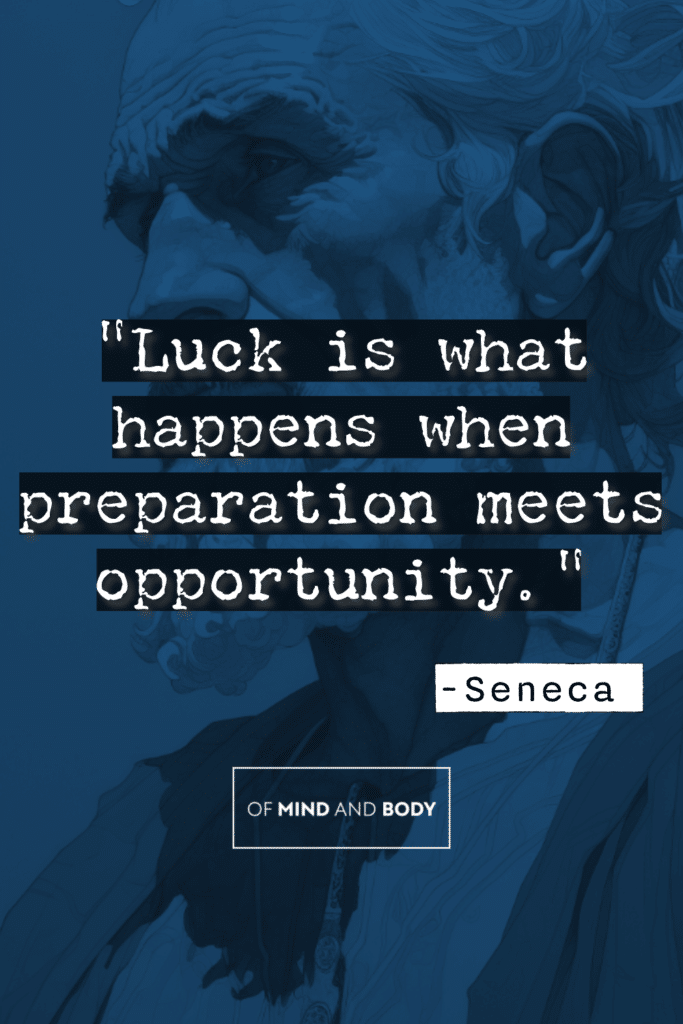
The Wisdom Behind the Words
This timeless adage from Seneca, the Stoic philosopher, encapsulates a profound truth about the nature of success and the role of hard work in achieving it. At its core, the quote dismantles the common misconception that luck is a whimsical force that randomly blesses a fortunate few. Instead, Seneca suggests that what we often perceive as luck is actually the result of diligent preparation meeting the right opportunity. This perspective shifts the focus from external factors, which we cannot control, to our own actions and preparations, over which we have full command.
The essence of this stoic quote lies in its empowering message: success is accessible to anyone willing to put in the necessary work to prepare for it. It underscores the importance of hard work, not as a guarantee of success, but as a means of being ready when opportunities arise. In a world that frequently attributes achievements to luck, Seneca’s words remind us that behind every “overnight success” is often a backdrop of unseen dedication and perseverance. This realisation encourages a proactive approach to life, urging individuals to cultivate their skills, knowledge, and character in anticipation of future opportunities.
Moreover, Seneca’s insight offers a comforting reassurance in the face of failure or missed chances. It suggests that the key to future success lies not in lamenting over perceived bad luck but in continuing to prepare diligently for the next opportunity. This philosophy fosters resilience, urging us to view each setback not as a defeat but as a call to better prepare ourselves for what lies ahead. In embracing this Stoic wisdom, we find a powerful catalyst for personal and professional growth, driven by the belief that our efforts today lay the groundwork for the opportunities of tomorrow. Thus, the quotes Stoic message is not merely an observation about luck but a call to action—a reminder that in the interplay of preparation and opportunity, our hard work is the most reliable architect of our fortune.
“It is a rough road that leads to the heights of greatness.”
Seneca
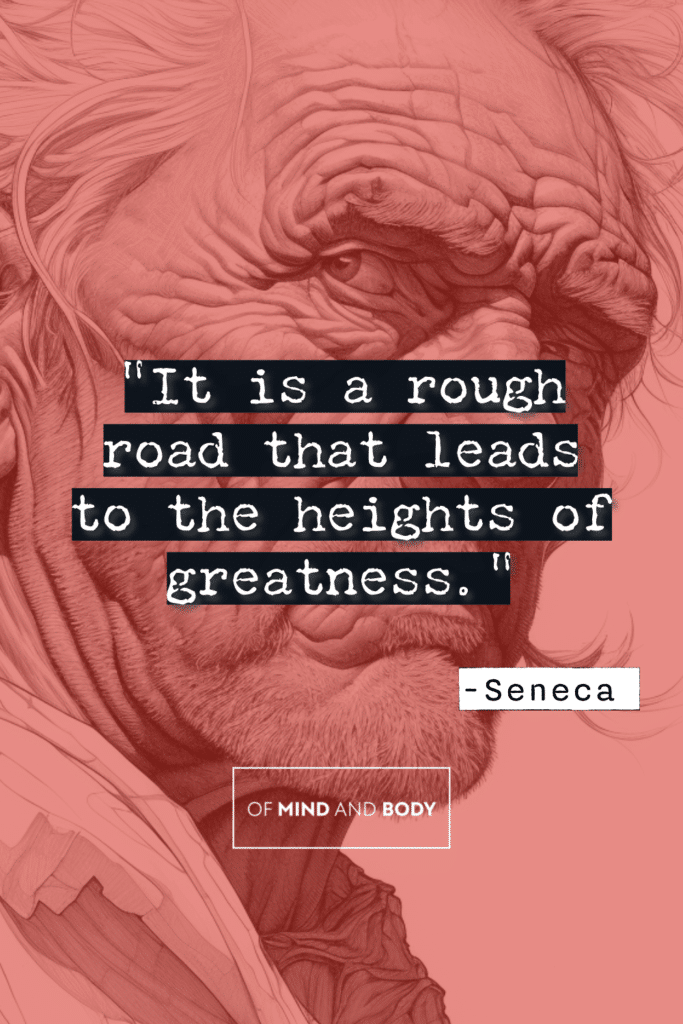
The Wisdom Behind the Words
This timeless adage from Seneca serves as a powerful reminder of the intrinsic link between adversity and achievement. The quote encapsulates the essence of Stoicism and its approach to life’s challenges. It suggests that the path to true greatness is inherently fraught with obstacles, hardships, and trials. This perspective encourages us to view these difficulties not as insurmountable barriers, but as necessary steps on the journey toward achieving our highest potential. The rough road, with all its bumps and turns, is not just a test of endurance but a crucible for refining our character, resilience, and determination.
In the context of hard work, Seneca’s words offer a profound insight into the nature of personal and professional growth. The journey to excellence in any field is rarely smooth or straightforward. It demands persistence, patience, and a willingness to confront and overcome the challenges that arise. Hard work, in this light, is not merely about the effort invested in tasks but also about the steadfastness with which one faces the inevitable setbacks and failures. The greatness that Seneca speaks of is not handed out freely; it is earned through the relentless pursuit of excellence, tempered by the trials we endure and the lessons we learn along the way.
This Stoic principle serves as a beacon of encouragement and motivation. It reminds us that the struggles we face in our endeavours are not only natural but necessary. They are the very experiences that shape us into stronger, more capable individuals. When faced with adversity, we should remember that each challenge is an opportunity to advance further on the path to greatness. The road may be rough, but it is on this road that we discover our true strength and potential. Embracing this journey with courage and resilience ensures that when we reach the heights of greatness, we will appreciate the view all the more for the rugged path we travelled to get there.
“Wealth is the slave of a wise man. The master of a fool.”
Seneca

The Wisdom Behind the Words
This poignant quote by Seneca encapsulates a profound truth about the nature of wealth and its role in our lives, particularly in relation to hard work and personal development. At its core, the statement challenges us to reconsider our relationship with material success and the efforts we expend to achieve it. For the wise, wealth is but a tool, a means to an end, and not the end itself. It serves their higher purposes—be it personal growth, the welfare of others, or the pursuit of virtue. In stark contrast, for those lacking wisdom, wealth becomes an end-goal, dominating their thoughts and actions, often leading them astray from more meaningful pursuits.
The essence of Seneca’s wisdom lies in the understanding that hard work and the pursuit of wealth should be directed by wisdom to be truly fulfilling. Hard work, when guided by a clear understanding of what is truly valuable, can lead to not just the accumulation of wealth but also to the enrichment of the soul. It teaches us discipline, resilience, and the value of effort, shaping our character and our destinies. The wise person works hard not just to accumulate wealth but to use it judiciously in service of what is good and noble, thus becoming its master rather than its servant. This perspective transforms the very nature of hard work, elevating it from a mere means of survival or a pursuit of wealth to a path toward personal excellence and virtue.
In navigating the complexities of life and the pursuit of success, let this Stoic principle serve as a guiding light. It encourages us to reflect on our intentions and the purpose behind our hard work. Are we toiling merely to serve our desires and become enslaved by the wealth we accumulate, or are we working diligently to master ourselves and use our resources wisely? The true measure of success, then, is not found in the wealth we amass but in our ability to harness it towards our growth, the betterment of others, and the pursuit of a meaningful and virtuous life. This quotes Stoic insight not only challenges us to work hard but to work wisely, ensuring that our labours lead us to true freedom and fulfilment.
Stoic Quotes on Hard Work from Epictetus
“No great thing is created suddenly.”
Epictetus
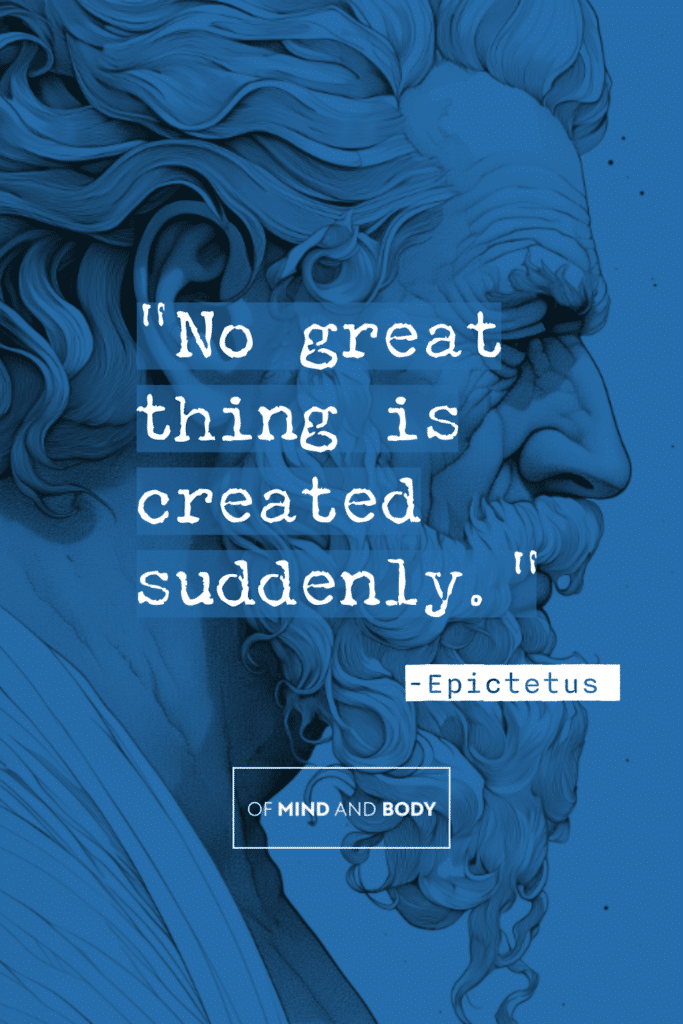
The Wisdom Behind the Words
This timeless piece of wisdom from Epictetus serves as a powerful reminder of the patience and perseverance required in the pursuit of any significant achievement. At its core, the quote underscores a fundamental truth about the nature of progress and success: they are the culmination of consistent effort, dedication, and the resilience to overcome inevitable setbacks. In a world that often seeks instant gratification and quick fixes, this Stoic principle calls us back to the reality that true greatness is a slow burn, a result of the hard work we’re willing to put in day after day, without immediate reward.
The journey towards creating something of great value is seldom a straight path. It is fraught with challenges, failures, and moments of doubt. Yet, it is precisely these obstacles that test our resolve and push us to grow beyond our perceived limits. The Stoic’s view, as encapsulated by Epictetus, invites us to embrace the process itself as part of the achievement. The hard work, the daily grind, becomes not just a means to an end but a valuable component of the end itself. This perspective shifts our focus from being overly fixated on the outcome to finding fulfilment in the growth and learning that occurs along the way. This quotes Stoic lesson teaches us that the essence of hard work is not just in reaching our goals but in becoming more resilient, disciplined, and wise individuals through the effort we invest.
Embracing this Stoic wisdom encourages us to cultivate patience and maintain our commitment to our goals, even when progress seems slow or invisible. It reassures us that every effort counts, that each step forward, no matter how small, is a crucial part of the tapestry of greatness we are weaving. This understanding can transform our approach to work and life, inspiring us to persevere through challenges with a sense of purpose and confidence in the value of our labour. In recognising that “no great thing is created suddenly,” we find the strength to continue our endeavours, fuelled by the belief that our hard work will, in time, culminate in something truly significant and rewarding.
“If you want to improve, accept being thought foolish and stupid.”
Epictetus
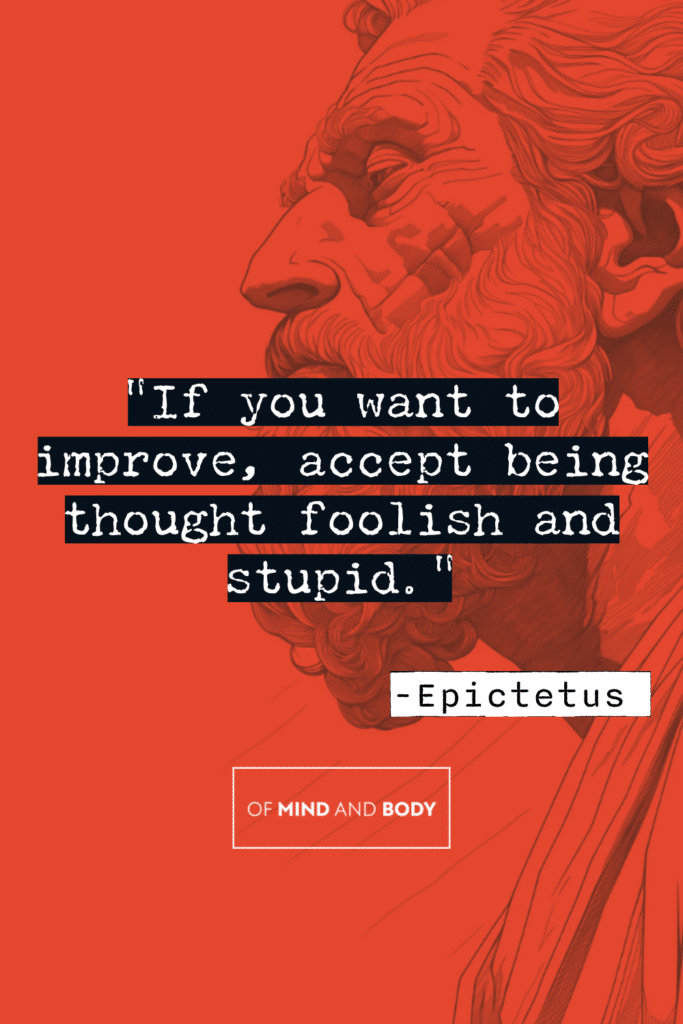
The Wisdom Behind the Words
In the journey towards self-improvement and mastery, the wisdom of Epictetus offers a liberating perspective: “If you want to improve, accept being thought foolish and stupid.” This profound quote cuts to the heart of one of the most significant barriers to growth—our fear of judgement and the opinions of others. The path to excellence, whether in professional endeavours, personal development, or the pursuit of knowledge, is often littered with failures, missteps, and moments of vulnerability. These are the very experiences that invite ridicule or criticism from onlookers. Yet, it is through embracing these moments, through the willingness to be seen as foolish or ignorant, that true learning and improvement occur.
Hard work, in its essence, is not just about the physical or mental effort exerted towards achieving a goal but also involves the courage to face and overcome the internal battles against ego and vanity. The fear of appearing foolish can paralyse, holding one back from taking the necessary risks to step out of comfort zones, ask questions, or embark on new ventures. The Stoic philosophy, as encapsulated by Epictetus, encourages a detachment from the superficial measures of success—praise, recognition, and the approval of peers—and instead focuses on the intrinsic value of the work and the growth it fosters within us. This mindset is liberating, allowing one to pursue their goals with a singular focus on improvement, unencumbered by the weight of external validation.
Embracing Epictetus’s counsel means recognising that the road to achievement is paved with the humility to learn from every situation, regardless of how it may appear to others. It is a call to value progress over perfection, understanding over appearance, and resilience over acceptance. This approach not only accelerates personal and professional development but also cultivates a sense of inner peace and satisfaction, knowing that the journey itself, with all its challenges and setbacks, is where true growth lies. In the realm of hard work, then, the willingness to be perceived as foolish is not a sign of weakness but a badge of honour, marking one’s commitment to transcend limitations and evolve beyond the ordinary.
“Progress is not achieved by luck or accident, but by working on yourself daily.”
Epictetus
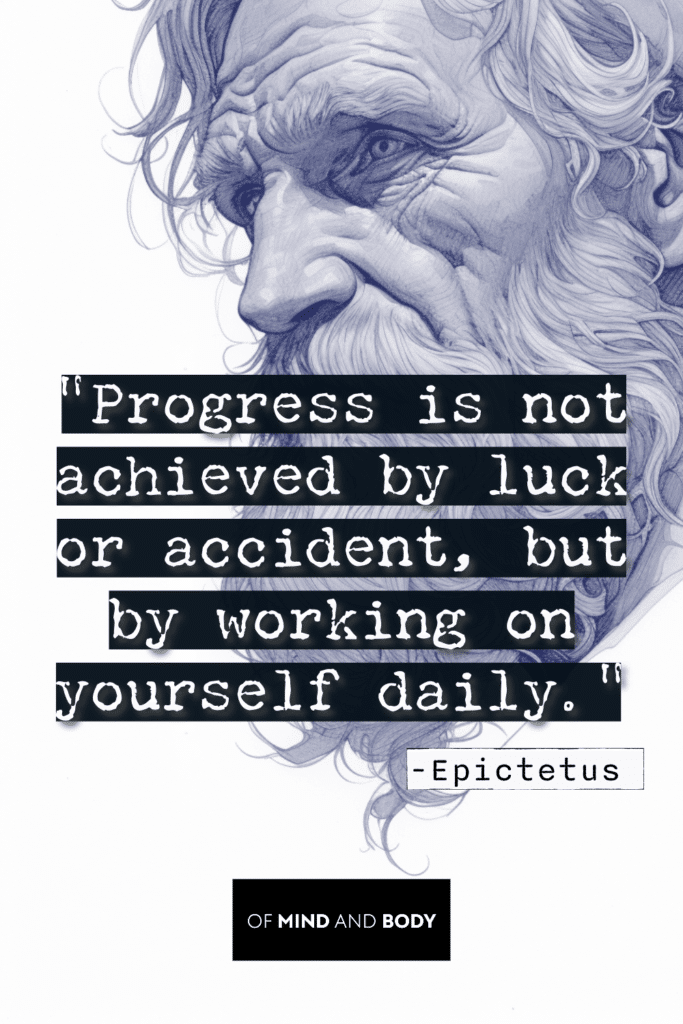
The Wisdom Behind the Words
These insightful quotes from Epictetus, a luminary of Stoic philosophy, serves as a powerful reminder of the intrinsic value of perseverance and hard work deliberate pursuit of self-improvement. It succinctly dismantles the often-misguided belief in luck or serendipity as the primary architects of success. Instead, it places the onus squarely on the individual’s commitment to daily effort and personal development. This perspective is not only liberating but also daunting, as it implies that the path to progress is paved with the bricks of consistent, often mundane work on oneself.
The essence of this quote lies in its call to action for embracing the grind of daily self–improvement, recognising that each day offers a new opportunity to edge closer to our goals. It’s a reminder that the grand tapestry of achievement is woven from the threads of daily habits, choices, and actions. This quotes Stoic principle encourages us to focus on what is within our control—our actions, reactions, and attitudes—rather than external outcomes, which are often unpredictable and beyond our influence. In the context of hard work, it champions the idea that diligence, discipline, and a commitment to excellence in small, everyday tasks cumulatively lead to significant achievements over time.
Moreover, this quote is a beacon of encouragement, urging us to persevere even when progress seems invisible. It acknowledges the challenges and setbacks inherent in any worthwhile endeavour, offering a philosophical strategy to remain steadfast and resilient. By framing progress as a product of daily self-discipline, it also provides a practical approach to overcoming the overwhelm that can accompany ambitious goals. Instead of fixating on the distant summit, we are guided to focus on the next step, the next action we can take towards self-improvement. This Stoic wisdom not only illuminates the path to personal and professional growth but also fosters a mindset equipped to navigate the complexities of life with grace and determination.
Stoic Quotes on Hard Work from Marcus Aurelius
“Do not act as if you had ten thousand years to throw away. Death stands at your elbow. Be good for something while you live and it is in your power.”
Marcus Aurelius

The Wisdom Behind the Words
This Stoic quote by Marcus Aurelius serves as a powerful reminder of the inevitability of encountering challenges and adversities in our daily lives. It underscores a fundamental Stoic principle: the importance of preparing oneself mentally for the day ahead, not by hoping for an easy path, but by steeling oneself against the difficulties that lie on the road to achieving one’s goals. This mental preparation is akin to a warrior donning armour before battle, not out of pessimism, but out of a profound understanding of reality. It is a call to embrace hard work, not just as a physical exertion but as a mental and emotional endeavour, fully aware of the obstacles that will arise.
The essence of this quote lies in its stark realism combined with an undercurrent of relentless optimism. By anticipating interference and ingratitude, one is not succumbing to a negative worldview but rather adopting a proactive stance towards the inevitable hardships of life. This perspective is crucial for anyone committed to the path of hard work and personal growth. It teaches us that the value of our endeavours is not diminished by the obstacles we face but is instead enhanced by our resilience and determination to overcome them. The anticipation of challenges does not deter us; rather, it sharpens our focus, fortifies our resolve, and prepares us to navigate through them with grace and steadfastness.
Moreover, this quote is a testament to the transformative power of hard work infused with stoic wisdom. It encourages us not to shy away from the day’s toils but to meet them head-on, with a heart fortified by the knowledge that these trials are not impediments but opportunities for growth and self-improvement. This mindset transforms the very nature of hard work from a burden to be borne to a challenge to be embraced, a crucial shift for anyone striving to achieve greatness in any field. In essence, Marcus Aurelius teaches us that the path to excellence is paved with the very obstacles we wish to avoid, and it is our response to these obstacles, fuelled by hard work and a stoic resolve, that defines our character and our destiny.
“Throw away your books; stop letting yourself be distracted. That is not allowed. Instead, as if you were dying right now, despise your flesh. A mass of blood, pieces of bone, a woven tangle of nerves, veins, arteries.”
Marcus Aurelius

The Wisdom Behind the Words
In this compelling exhortation from Marcus Aurelius, we are confronted with a stark reminder of our mortality and the fleeting nature of existence. The directive to “throw away your books” is not a literal denunciation of learning, but rather a call to action against the paralysis of over-preparation and procrastination. It’s a vivid appeal to focus on what truly matters, urging us to cut through the noise and distractions that fill our lives. This message resonates deeply in the context of hard work, emphasising the importance of dedicating ourselves to our endeavours with the urgency and intensity that the imminence of death imparts. It’s a reminder that the time for action is now, as we do not have the luxury of infinite tomorrows.
Aurelius’s reference to despising our flesh, “a mass of blood, pieces of bone, a woven tangle of nerves, veins, arteries,” serves as a powerful metaphor for transcending our physical and immediate desires in pursuit of something greater. In the realm of hard work, this can be interpreted as an encouragement to rise above our comfort zones, our tendencies towards laziness, and our fear of failure. It’s a call to embrace discomfort, recognising that the path to true achievement and self-improvement is often paved with challenges and sacrifices. This perspective shifts our focus from short-term gratifications to the long-term rewards of perseverance, discipline, and resilience.
Ultimately, this quotes Stoic message is a profound meditation on the essence of human endeavour and the spirit of hard work. It encourages us to live with a sense of urgency, to prioritise our actions wisely, and to engage deeply with our work, knowing that our time is limited. By confronting the reality of our mortality, we are inspired to work with a purpose, to strive for excellence, and to make the most of the precious time we have. This Stoic wisdom not only motivates us to pursue our goals with fervour but also offers a grounding perspective on what it means to live a life of significance and fulfilment.
“Begin each day by telling yourself: Today I shall be meeting with interference, ingratitude, insolence, disloyalty, ill-will, and selfishness.”
Marcus Aurelius
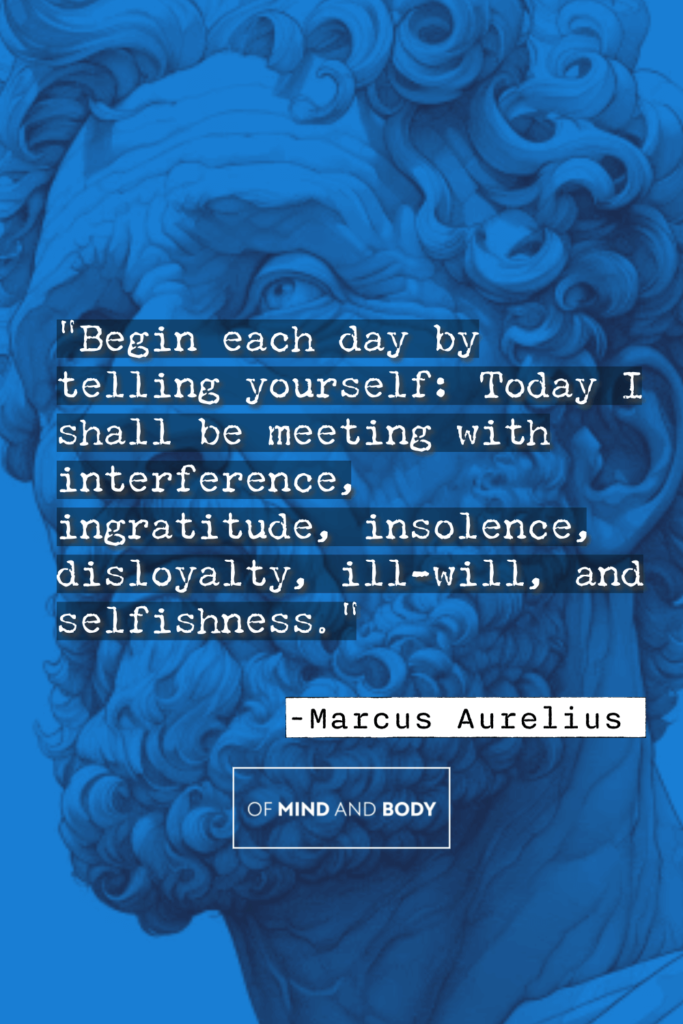
The Wisdom Behind the Words
This Stoic quote by Marcus Aurelius serves as a powerful reminder of the inevitability of encountering challenges and negative behaviours in our daily lives. It’s not a pessimistic view, but rather a pragmatic strategy for mental preparation. By anticipating these difficulties, we arm ourselves with the resilience and fortitude necessary to face them head-on. This mindset is particularly relevant to the concept of hard work, as the path to achieving our goals is often littered with obstacles that test our patience, resolve, and commitment. Acknowledging the presence of these challenges from the outset equips us to navigate them more effectively, ensuring that we remain steadfast in our pursuits despite the adversities we may encounter.
The essence of this quote lies in its call to embrace a proactive rather than reactive stance towards life’s inevitable hardships. In the realm of hard work, this means recognising that the road to success is fraught with setbacks and opposition, yet choosing to persevere with dignity and effort. This Stoic wisdom encourages us to cultivate a sense of inner peace and strength, allowing us to remain undeterred by external circumstances. It teaches us that our control lies not in the events themselves, but in our responses to them. By starting each day with the expectation of encountering resistance, we can develop a more resilient and adaptable mindset, one that views every obstacle as an opportunity for growth and every instance of opposition as a chance to practice patience and understanding.
Moreover, this quote underscores the importance of hard work not just as a means to an end, but as a virtue in its own right. The anticipation of interference and ingratitude reminds us that the value of our endeavours does not solely reside in their outcomes, but also in the strength of character we develop along the way. It’s a call to action to approach each day with courage, integrity, and a steadfast commitment to our principles, regardless of the external validation we may or may not receive. In doing so, we not only move closer to our goals but also become more virtuous, resilient individuals. This Stoic approach to hard work and life’s challenges offers a profound blueprint for living with purpose and dignity, ensuring that we remain undaunted in the face of adversity and true to our path despite the trials we may face.
Final Thoughts
As we reflect on the profound wisdom encapsulated in these Stoic quotes on hard work, it becomes clear that the path to fulfillment and excellence is paved with persistence, discipline, and a mindful approach to our challenges. The Stoics remind us that greatness is not bestowed but forged in the crucible of consistent effort and a steadfast commitment to our principles.
By embracing the Stoic virtues of resilience and purposeful action, we equip ourselves to navigate the complexities of life with grace and fortitude. Let these timeless insights inspire us to approach our endeavors with a renewed sense of dedication, reminding us that every step taken in the spirit of hard work moves us closer to the best versions of ourselves.






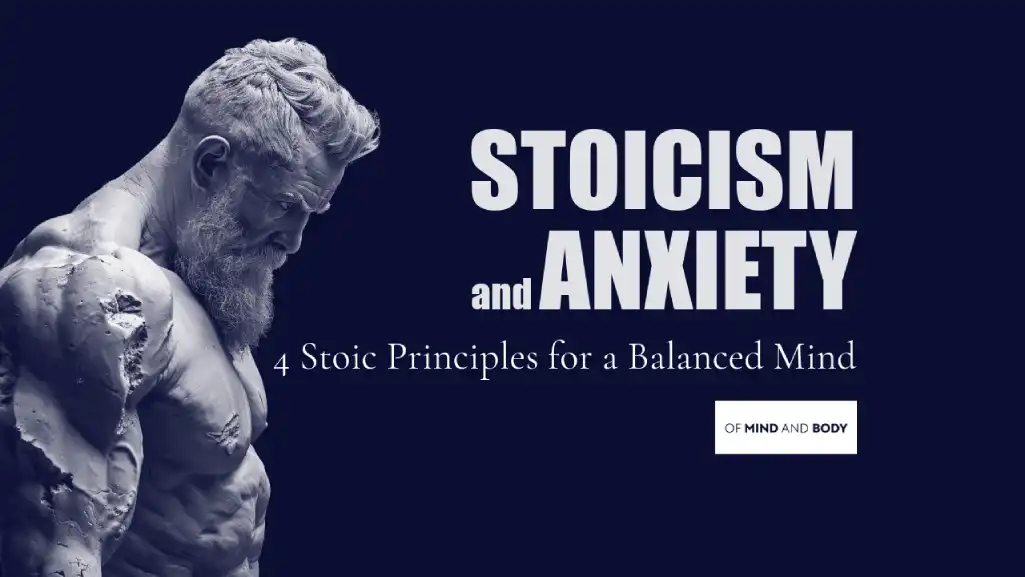
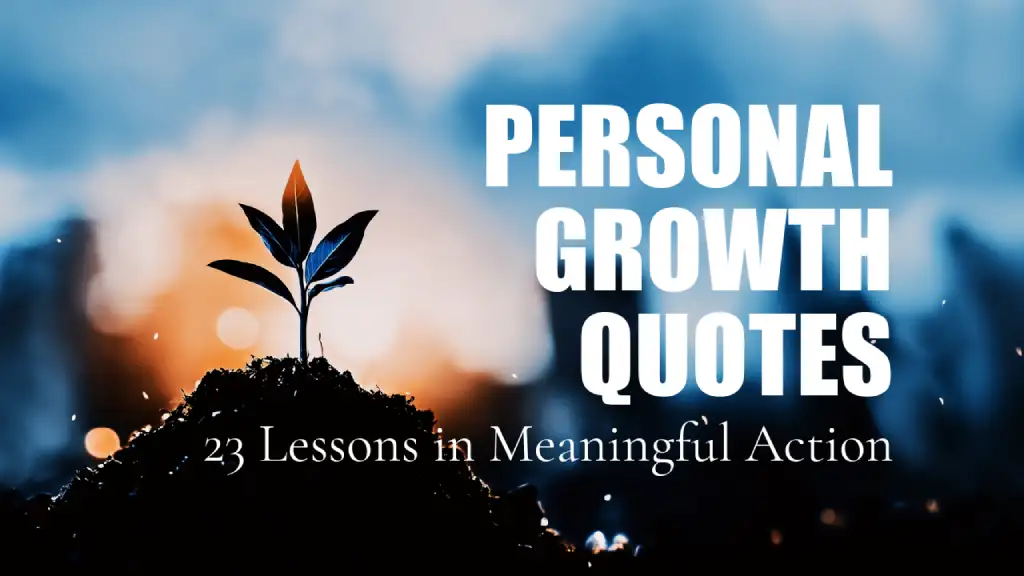
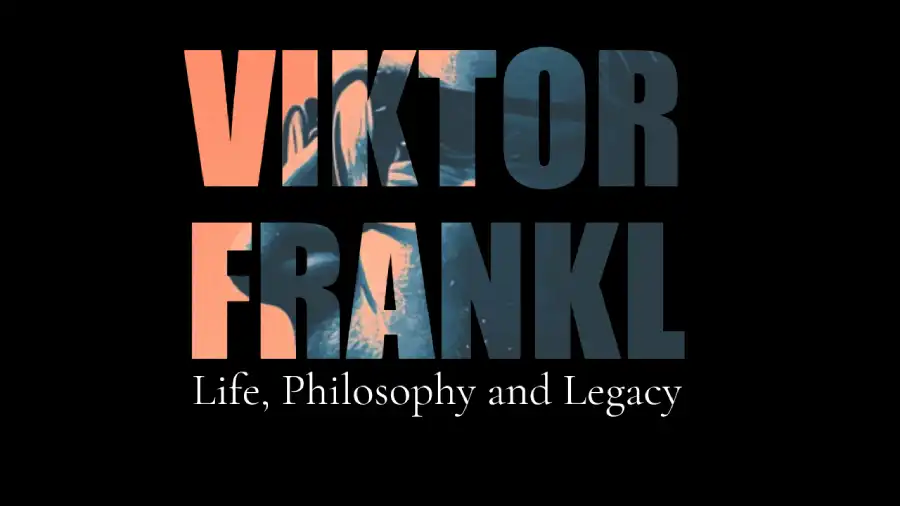
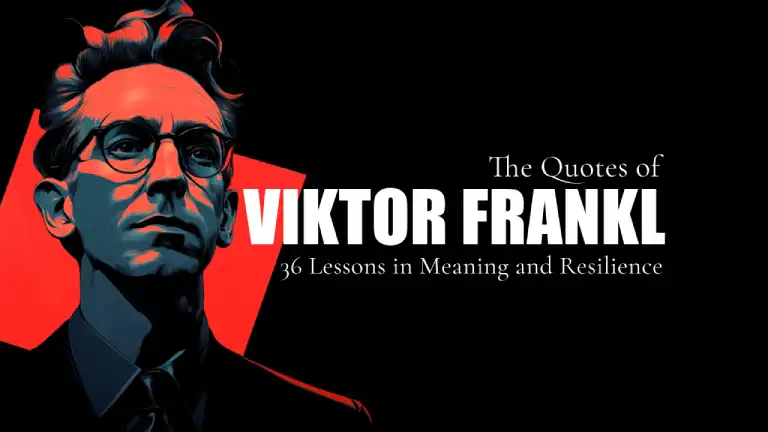

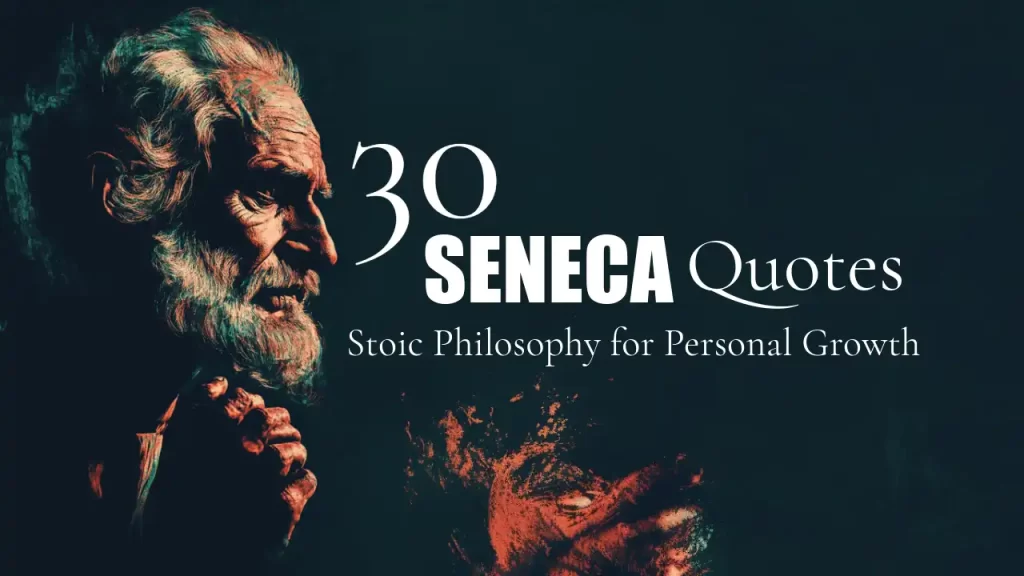


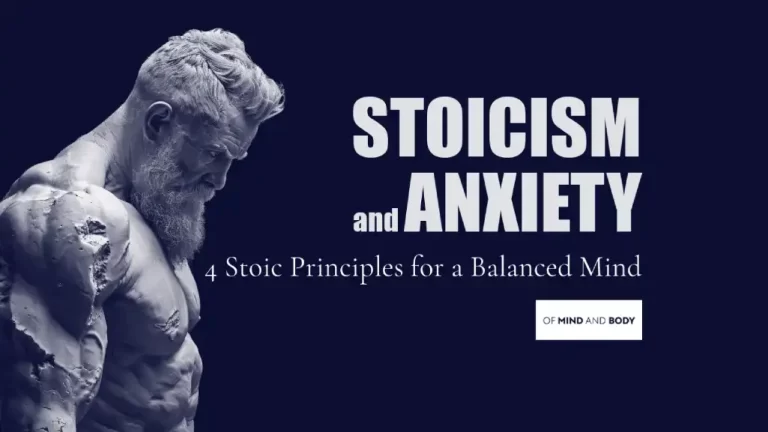
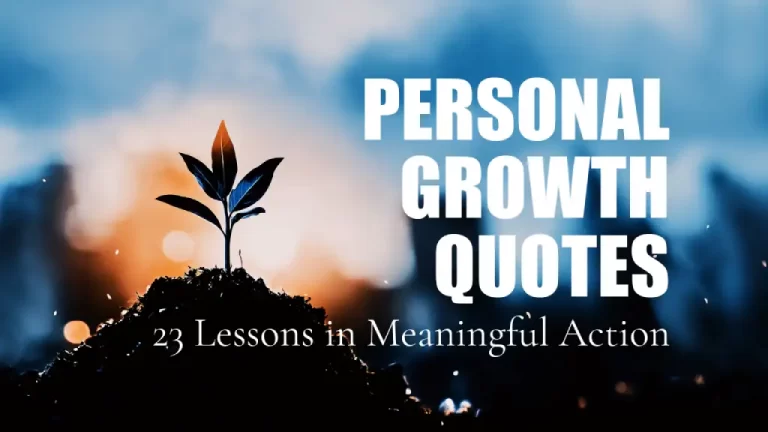

One Response
I like this site because so much useful stuff on here : D.